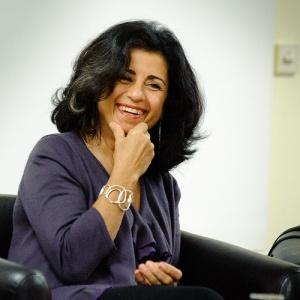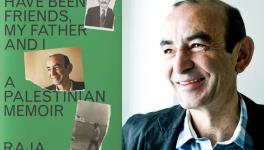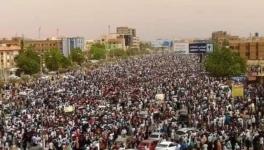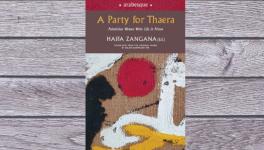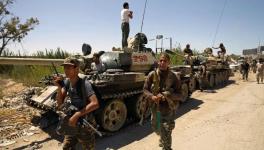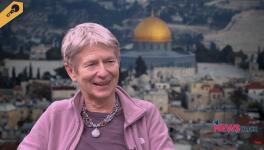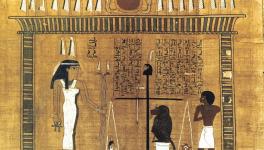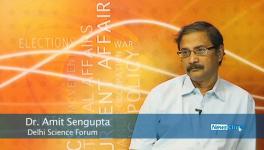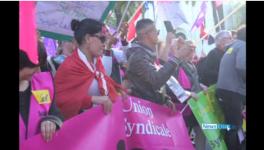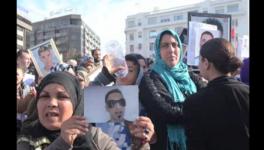Ahdaf Soueif: Egypt is Not Going to Give Up Its Hopes
Ahdaf Soueif is the author of the bestselling The Map of Love (shortlisted for the Booker Prize in 1999 and translated into 28 languages). She is a writer and political and cultural commentator, and has also initiated the Palestine Festival of Literature (PalFest) in 2008. Soueif talks to Newsclick about the recent political events in Egypt, PalFest, and writing.
Q.Two years after the revolution in Egypt, people are still out on the streets, protesting and clashing with the police. In what ways has the new administration failed the people? Are the masses set for another revolution?
A. The new administration is acting as though it came to power in normal elections contested with the Mubarak regime. It does not seem to understand that the country revolted against the Mubarak regime because of its economic policy, its movement away from any idea of social justice, and its reliance on police brutality. The Muslim Brotherhood presidency is conducting affairs as though it was 'business as usual'. Killings and kidnappings of activists have continued, and military trials for civilians have been inserted into the constitution. Rapprochements are being made with members of the old regime ('reconciliation' without 'truth'), foreign loans are sought to plug budget deficits (rather than set up intensive employment infra-structure projects), and opaque deals are being made. Meanwhile, the country is well aware of its own articulated hopes, and of the price it has paid for them in the last two years, so it is not going to give them up. We are seeing the waves of revolution grow bigger, and if the administration does not do a volte-face, then we will have a bigger and more violent revolution than the last one.
Q. In one of your articles in The Guardian, you have said that 'In times of crisis, fiction has to take a back seat.' Do you believe that every writer, no matter what his or her genre is, should address the political turmoil of the country he/she lives in? How important do you think it is for a writer of any genre to understand the politics of his/her country?
A. I found that in the situation of the revolution I had to prioritise action, and immediate writing (eg. a regular column in the papers plus occasional pieces) over fiction since time and energy are finite. So “has to” here (in her statement) was descriptive rather than prescriptive. I don’t think I would ever be prescriptive about art. I don’t believe that the writer is obliged to write about any particular topic. A writer writes about what moves them to write. If they are not moved by the political turmoil in their country and can write a good novel about something else, something removed, that’s fine.
I think it is important for a citizen to understand the politics of his/her country and the politics of the world. The writer can decide how much of the citizen will come into the writing.
Q. Your initiative 'PalFest' inspires several young Palestinian writers and other creative artists. How did the idea and theme of PalFest arise in your mind and how did you nurture it?
A. Well, that’s a nice description for it. A group of us: friends, writers and activists, decided to set up a festival that would bring guest artists to Palestinian audiences under Israeli military occupation. So we co-ordinated with our friends in Palestine, invited our first batch of authors, raised the funds, and took the first PalFest on tour in 2008. PalFest has now run for 5 years.
Q. Do you think your writing has changed over time? How would you compare your novel 'In the Eye of the sun' with your memoir 'Cairo: My City, Our Revolution' in terms of maturity in writing?
A. I hope I’ve become more accomplished, better at what I do. But in the end I think both books have a lot in common: they are passionately interested in people, and they are interested in their characters’ interaction with their time and place, their politics and history. They are rooted in their location. I hope they are written in sympathy and energy.
Q. When did you read your first book? How was your relationship with books as a child? Had fiction always appealed you since your childhood?
A. I read my first book in London where my parents were studying. I was five years old. On the way back from school every day, we would stop at the public library and would borrow books. I’ve loved reading fiction ever since.
Q. Would you ever consider writing a series or a sequel to any of your books?
A. Yes. If that seemed like the most ‘fictionally’ interesting place I could go.
Q. What do you think makes good writing?
A. Imagination and craft.
Disclaimer: The views expressed here are the interviewee's personal views, and do not necessarily represent the views of Newsclick.
Get the latest reports & analysis with people's perspective on Protests, movements & deep analytical videos, discussions of the current affairs in your Telegram app. Subscribe to NewsClick's Telegram channel & get Real-Time updates on stories, as they get published on our website.









